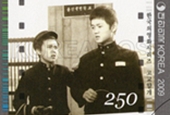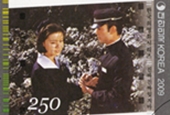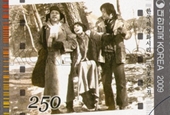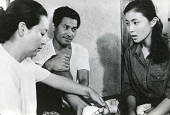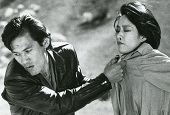View this article in another language
- 한국어
- English
- 日本語
- 中文
- العربية
- Español
- Français
- Deutsch
- Pусский
- Tiếng Việt
- Indonesian
Heavenly Homecoming to Stars (1974)
Directed by Lee Chang-ho
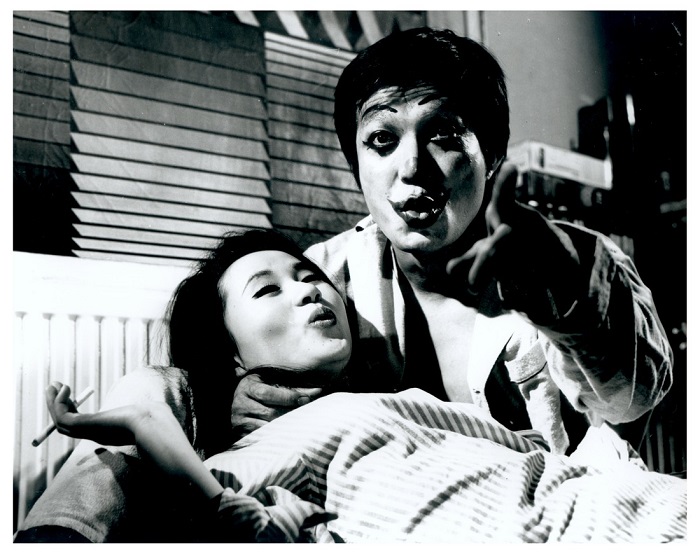
This movie was the debut of director Lee Chang-ho, who had long been an assistant director to Sin Sang-Ok. When it was released in 1974, it attracted around 460,000 viewers, the highest number in the history of Korean cinema up to that point. Many film critics say that it was the first movie to feature the new "youth culture" of the 1970s, characterized by modernization and influences from the West represented by acoustic guitars, jeans and draft beer. The screenplay was based on the mega-hit newspaper serial of the same title published by author Choi In-ho, a symbolic youth figure during the early 1970s.
The protagonist, GyeongAh, became an icon of the 1970s. The movie went through many changes and transformations afterward, finally being tagged as a "hostess melodrama," one of the most widely popular genres up until the 1980s.
A hostess melodrama refers to a genre of film that deals with the love and life of women who came to the capital from the countryside and due to the harshness of society had to work in prostitution. Painting their sense of loss, virginity and idealism, and missing their hometown, mother and family were all prerequisite elements. This was usually the starting point to begin the story.
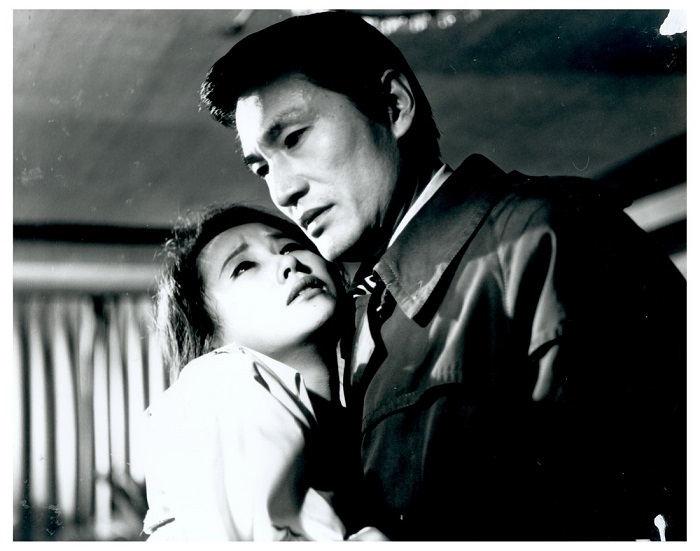
The movie begins with a scene where MunOh spreads GyeongAh's ashes across the water. From the beginning, the movie is all about MunOh's sympathy and condolences toward GyeongAh. Her relationships with a number of men left scars, either physical or symbolic, ranging from physical abuse and tattoos through to an imagined pregnancy. The movie enhances her physical, emotional and psychological trauma with the use of visual and acoustic effects.
In one scene, where GyeongAh receives an abortion, the screen is filled with red and the camera angle is unsettling, while the song "A Girl is Crying Out There" is used as background music. Through this, the movie expresses the pain of women who are questioned morally by society. Hostess melodramas continue to talk about gender and sex and tend to classify women into the lower classes of society.
In the movie, GyeongAh is a symbol of "exchange" in a hierarchical capitalistic society. After failing at her first love, GyeongAh's youth was exchanged for the economic capacity of her new husband. Her third partner exchanged her with money, forcing her to work as a bar hostess and as a nude model. Later, the third man visited MunOh and forced him to return to GyeongAh, and then asked him to take her away again.
Suffering from continued shakedowns, losses and both emotional and physical pain, she plunges into serious depression and eventually kills herself. As the story draws to a close, her social status gets lower as she builds more experience and suffers more losses.
In the movie, she said to MunOh that, "It's weird. Women are judged by and our lives are determined by men. Those who pass through my life remain somewhere in my flesh."
It's at that moment that she recognizes and redefines herself as one who is living in a hierarchical society. Previously, she considered herself an empty soul.
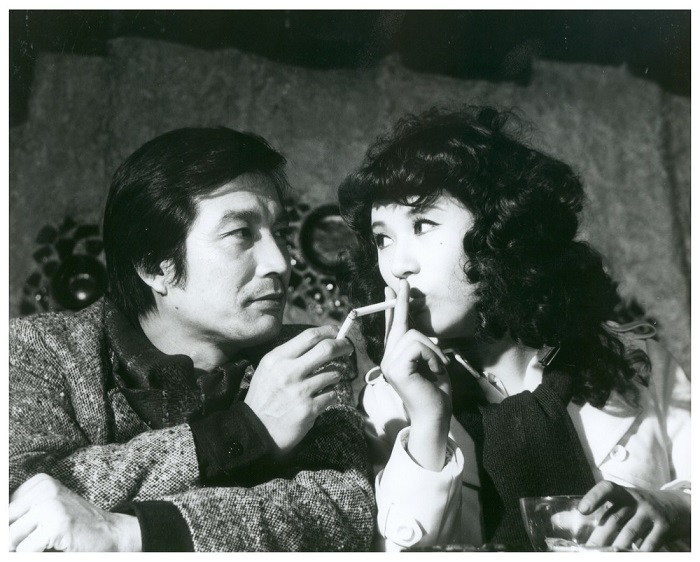
Her acceptance and recognition that she was "occupied" by other people has the equal meaning that there are still some parts of her inner soul that remain unoccupied. Killing herself in the end rather suggests that she took some time for introspection.
The most subversive moment in the movie is probably the brief appearance of the daughter of her ex-husband. It's interesting in that she was raised by a neurotic father who continued to suspect her parentage and forced her to wear only black. When she was watching GyeongAh being dumped by her father in the rain, she was probably able to see her future in an oppressed life in a hierarchical society.
* This series of articles has been made possible through the cooperation of the Korean Film Archive.
*Click here to see previous parts in the series about Korea.net's must-see films.
Directed by Lee Chang-ho
GyeongAh, played by actress An In-suk, was bright and simple. She was dumped by her boyfriend and became the second wife of Lee ManJun, played by Yun Il-bong. Lee had driven his former wife to death because of his delusion of infidelity. Traumatized by GyeongAh's abortion, Lee leaves her, too. She starts work as a bar hostess, tricked into it by DongHyuck, played by Baek Il-sup.
GyeongAh then meets MunOh, played by Sin Seong-il, by chance and they start to live together. They are glad to spend time together. One day, DongHyuck visits GyeongAh and threatens her, telling her to break up with MunOh. After leaving MunOh, GyeongAh gets addicted to alcohol and plunges into depression.
Sometime later, MunOh visits GyeongAh. He watches her sleep for a while, and then puts some money on the bedside before leaving.
GyeongAh was in complete disorder, seeking out both alcohol and partners. One snowy day, she visits her mother in her hometown. After seeing her mother, she consumes a large dose of sleeping pills and falls asleep deep in the mountains.
In the final scene, MunOh sprinkles her ashes across a river.

This movie was the debut of director Lee Chang-ho, who had long been an assistant director to Sin Sang-Ok. When it was released in 1974, it attracted around 460,000 viewers, the highest number in the history of Korean cinema up to that point. Many film critics say that it was the first movie to feature the new "youth culture" of the 1970s, characterized by modernization and influences from the West represented by acoustic guitars, jeans and draft beer. The screenplay was based on the mega-hit newspaper serial of the same title published by author Choi In-ho, a symbolic youth figure during the early 1970s.
The protagonist, GyeongAh, became an icon of the 1970s. The movie went through many changes and transformations afterward, finally being tagged as a "hostess melodrama," one of the most widely popular genres up until the 1980s.
A hostess melodrama refers to a genre of film that deals with the love and life of women who came to the capital from the countryside and due to the harshness of society had to work in prostitution. Painting their sense of loss, virginity and idealism, and missing their hometown, mother and family were all prerequisite elements. This was usually the starting point to begin the story.

The movie begins with a scene where MunOh spreads GyeongAh's ashes across the water. From the beginning, the movie is all about MunOh's sympathy and condolences toward GyeongAh. Her relationships with a number of men left scars, either physical or symbolic, ranging from physical abuse and tattoos through to an imagined pregnancy. The movie enhances her physical, emotional and psychological trauma with the use of visual and acoustic effects.
In one scene, where GyeongAh receives an abortion, the screen is filled with red and the camera angle is unsettling, while the song "A Girl is Crying Out There" is used as background music. Through this, the movie expresses the pain of women who are questioned morally by society. Hostess melodramas continue to talk about gender and sex and tend to classify women into the lower classes of society.
In the movie, GyeongAh is a symbol of "exchange" in a hierarchical capitalistic society. After failing at her first love, GyeongAh's youth was exchanged for the economic capacity of her new husband. Her third partner exchanged her with money, forcing her to work as a bar hostess and as a nude model. Later, the third man visited MunOh and forced him to return to GyeongAh, and then asked him to take her away again.
Suffering from continued shakedowns, losses and both emotional and physical pain, she plunges into serious depression and eventually kills herself. As the story draws to a close, her social status gets lower as she builds more experience and suffers more losses.
In the movie, she said to MunOh that, "It's weird. Women are judged by and our lives are determined by men. Those who pass through my life remain somewhere in my flesh."
It's at that moment that she recognizes and redefines herself as one who is living in a hierarchical society. Previously, she considered herself an empty soul.

Her acceptance and recognition that she was "occupied" by other people has the equal meaning that there are still some parts of her inner soul that remain unoccupied. Killing herself in the end rather suggests that she took some time for introspection.
The most subversive moment in the movie is probably the brief appearance of the daughter of her ex-husband. It's interesting in that she was raised by a neurotic father who continued to suspect her parentage and forced her to wear only black. When she was watching GyeongAh being dumped by her father in the rain, she was probably able to see her future in an oppressed life in a hierarchical society.
* This series of articles has been made possible through the cooperation of the Korean Film Archive.
*Click here to see previous parts in the series about Korea.net's must-see films.
